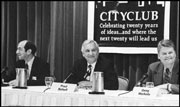WHO WILL BE Seattle’s next mayor?
That question is surprisingly, though excitingly, hard to answer. Conventional wisdom would grant the sitting mayor a free pass through the primary, at least, but incumbent Paul Schell is running in a dead heat with challengers Greg Nickels and Mark Sidran.
While Sidran is best known for championing the city’s civility laws, he’s reinvented himself as a critic of Sound Transit’s embattled light-rail plan. This strategy is working: His poll numbers improved immediately after he unveiled his $100,000 anti-light-rail TV ad campaign, in which he links Schell and Nickels to the transit agency’s failings. He’s also blasting light rail—and his two top opponents—in his campaign mailers.
Although Sidran’s no transportation expert and didn’t come out against light rail until the eve of his campaign kickoff, his gamble to build his campaign around criticizing the program (rather than spotlighting his Rudy Guiliani stands on homelessness and public safety) is winning voters. Consultant Cathy Allen says Sidran’s tactics are effective because they add substance to a dull campaign. “I think it shows the hunger the press has right now for debate—for something you can sink your teeth into,” she says. She also says that Sidran’s slow-starting campaign may have worked to his advantage, keeping press scrutiny on Nickels and Schell, while Sidran himself maintained a low media profile. After loaning his campaign $100,000, he’s now leading in the bank account category with $389,282 to Schell’s $361,006 and Nickels’ $342,109.
Nickels answered Sidran’s ads with his own $100,000 TV campaign, but Schell hasn’t decided if he’ll buy TV time. “We haven’t bought any yet,” was all Schell’s campaign manager, Karen Besserman, would say. It’s an unusual tactic: Schell’s 1997 campaign spent $80,000 on primary TV ads and a similar amount in the final. This time, they’re choosing instead to concentrate on direct mail and radio advertising.
Dan Kully, West Coast director for Democratic media consultants Laguens Hamburger Stone, says Sidran’s light-rail focus seems designed to appeal to the undecided voters he needs to survive the primary. But Allen warns that, if Sidran advances, he could have a hard time beating a more moderate opponent. “If you are Nickels or Schell,” she says, “you want a general election opponent you can put in a strident box.” Says Kully, “He clearly needs to convince voters that he has what it takes to be the next mayor.”
SIDRAN MAY NOT be running on his record, but he isn’t running away from it, either. He says he’s proud of his work on the civility laws and in passing legislation to confiscate the cars of motorists caught driving with suspended licenses. He touts his accomplishments during his 12 years of running the city attorney’s office. But Sidran’s perceived insensitivity to the poor and his continuing crusades to close troublemaking music clubs guarantee that he has vocal critics.
In response, Sidran is playing up his positives. He’s easily the funniest and most plainspoken of the three candidates. And he’s not embarrassed about running a one-issue campaign: During last Friday’s CityClub debate, he starting bashing Sound Transit during the two minutes he was given to introduce himself. Even his nine-page “Plan to Get Seattle Moving Again”—an attempt to lend some heft to his anti-Sound Transit position—merely states a few vague positions before segueing into another litany of gripes about his opponents. His main campaign mailer is equally negative, with gibes against both Nickels and Schell and unflattering photos of his rivals. As one voter notes, “You have to turn the page twice before you read anything positive [about Sidran].”
While Sidran risks a backlash from going negative, his opponents are staying the “Seattle Nice” course. Schell’s mailers prominently feature his wife, Pam—plus a guest appearance from Hansa, the Woodland Park Zoo’s baby elephant (who, like most pachyderms, is probably in the Sidran camp). He’s focusing on his record of delivering for Seattle’s neighborhoods through ballot measures funding parks, community centers, and libraries that were passed on his watch. Curiously, both his mailers and his radio commercials feature lavish praise for Schell’s accomplishments from former Mayor Charles Royer, who beat Schell in the 1977 mayoral final.
Too hesitant to give his rivals the needle early in the campaign, Schell is finally showing signs of combativeness. He accused Nickels of “demagoguery” at a recent forum after the challenger claimed the $72 million City Hall project should have gone to a public vote. After a round of Sidran on the attack at the CityClub debate, Schell replied: “One of the biggest advantages of being a candidate for mayor without being mayor is you can say almost anything.”
To the surprise of no one, Nickels has kept things light and upbeat in his campaign mailers, although his TV commercial blasts Schell’s direction as mayor and Sidran’s divisiveness—harsh words for the mild-mannered King County Council veteran. His critique of Schell’s failings during the Mardi Gras violence has become almost a campaign mantra. During a recent debate on KUOW-FM, he blasted Sidran as a transit novice “taking potshots from the sideline.” Sidran’s negative attacks “are a reflection of how he would govern as mayor,” noted Nickels. “I think it’s a reflection of how he conducts himself as a public official, and if that’s what people want in their next mayor, he’s going to win overwhelmingly.”
Perhaps, but the one thing this race doesn’t have is an overwhelming favorite. One political observer calls this the first major city election in recent memory where candidates have actually seen their vote totals drop from poll to poll.
But, as much as Seattleites have enjoyed playing undecided voters, the vote-switching ends on Sept. 18, after which only two of the Big Three will remain standing. Which two is anybody’s guess.






